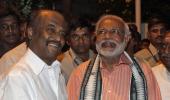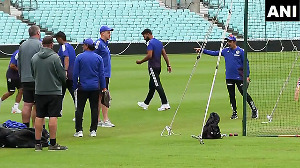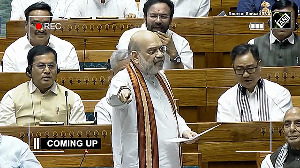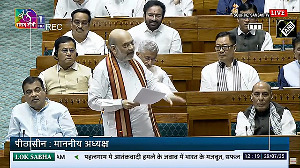Truth be acknowledged, Rajinikanth is not known for wanting to leave his comfort zone to take the politico-electoral plunge, even if it meant his becoming the chief minister of a state that has conferred Tamil cinema’s superstardom on him over the past 25 years.
Today, his fans belong to the younger generation all right, but their numbers are far fewer than their counterparts in the ’90s. They are not devoid of personal ambitions and agendas, unlike what Rajinikanh wants them to be, if he and they were to enter politics, says N Sathiya Moorthy.
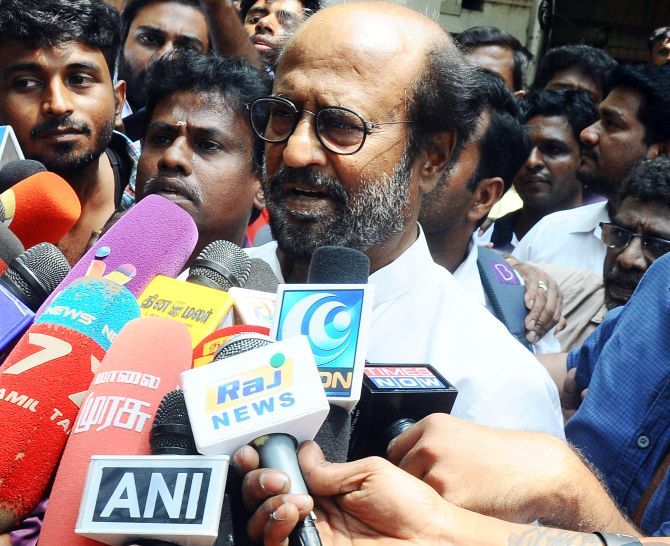
Tamil superstar Rajinikanth’s public declaration that he did not want to become chief minister but would be satisfied with being a ‘bridge’ to replace the two-party ‘Dravidian rule’ of the past 54 years, is unlikely to go down well with his fans -- and also a section of the voters who wanted ‘change’.
If anything, there will be less and less of media talk on the subject as Tamil Nadu moves towards the all-important assembly election by May 2021, contrary to his appeal to the media to take his message to the masses -- and help convince them, too.
The actor-aspiring politician’s 30-minute news conference in a Chennai star hotel, after his second meeting with office-bearers of his Rajini Makkal Mandram (RMM) in a fortnight, had all the cinematic elements, from a halting and disjointed start to a climax, in which he reaffirmed his faith in the Tamil Nadu voters, the state’s youth and also knowledgeable NRIs who wanted to work for the people here if there was change.
In the process, Rajini took off from the theme of upcoming superstar replacement ‘Thalapathi’ Vijay’s 2018 A R Murugadoss blockbuster Sarkar, and declared his intention to make a competent person the chief minister, and have a party leadership that will direct the government on policy-matters and keep a watch on performance.
Yet, the septuagenarian was non-committal about leading a new party too, other than saying that if he could not convince the TN voter to change tack now, he could not expect it five years hence in elections 2026, when he himself would be 76.
Apart from questions of the government taking orders from the party, as MGR as DMK treasurer had possibly hoped when he helped M Karunanidhi become chief minister after party-founder C N Annadurai’s death in 1969, there are constitutional issues, too.
It is often argued in the case of neighbouring Kerala that the steering committee of the ruling alliance of the time often gets to see official files in context of policy-making and keeping an eye on official businesses, to weed out corruption, was unconstitutional.
There is the even more important UPA experiment when Congress president Sonia Gandhi was made the chairperson of the National Advisory Committee (NAC) and had to be conferred a Cabinet rank, to justify the panel taking a peep into official records. There were even reports of some official files finding their way to her residence, and it became an issue.
Rajinikanth also announced his intention to field 65-70 per cent candidates in the age-group of 45 years and above, and fill the remaining with experienced bureaucratic veterans and local do-gooders whom the population wanted to enter politics.
“I will myself go and meet them, urging them to enter take an elected role,” he said, contradicting himself on the question of his becoming chief minister -- thus wanting others to shoulder responsibilities that he would not want to.
In context, Rajini also indicated his idea of ‘crowdsourcing’ of election work for his party, without using a modern-day start-up industry’s funding model.
“The Dravidian majors, DMK and AIADMK, have over 50,000 elected office-bearers each, and they interfere in the government once elected. We need grassroots-level office-bearers only during election time, and not all through the next five years,” he declared.
An alternative could well be outsourcing of election/party-related work to manpower corporates as in the West, but Rajini did not seem to have given any thought to funding sources for whichever operation of the kind that he may settle for.
He also did not indicate how younger elements would get political exposure and experience if the party did not train them 24x7. Nor did he declare that his 65:35 formula for elected offices would remain a permanent fixture of his kind of politics, as he decried the existing practice of incumbent legislators continuing forever.
The superstar declared that DMK’s M K Stalin wanted to prove the Karunanidhi ‘legacy’ after his father’s death in 2018, in the assembly polls next year. The ruling AIADMK rival of the party is under compulsion to prove the post-Jayalalithaa’s legacy of two chief ministers -- one incumbent and the other, former -- in Edappadi K Palaniswami (EPS) and O Panneerselvam (OPS) respectively.
He did not refer much to the national parties, especially the ruling BJP at the Centre, nor to Prime Minister Narendra Modi. He made an off-the-track passing reference to the minorities and their reservations on CAA and the like -- but again did not elaborate. He did not take questions, as he did not want his message of the day to get diluted when presented to the public.
Why then the out-of-turn news conference? Rajini offered a ready explanation. At his earlier meeting with RMM office-bearers in the city the other day, he had floated the idea of separating party from power, and his not becoming chief minister,.
“I could have become chief minister even in 1996, when the late G K Moopanar, P Chidambaram and my friend, the late Cho S Ramaswami mooted the idea. I am not after power, it is not in me,” he said, replaying the visual of his address to his fans on the New Year’s Eve, 2017, where he reiterated the position. “If I had not wanted to become CM at 45, why would I want to become one now?” he asked.
For his fans, who are disappointed, he left it to them to decide on his own political plans -- or, so it seems. “I did not want to wait until the elections to come up with my three-point charter, including my decision not wanting to be CM. I want to leave the thought with the people, and will take my next step after knowing their mood,” he declared, thus leaving open even his 2017 declaration of entering the electoral scene directly in 2021.
Truth be acknowledged, Rajinikanth is not known for wanting to leave his comfort zone, to take the politico-electoral plunge, even if it meant his becoming the all-important chief minister of the state that has conferred Tamil cinema’s superstardom on him over the past 25 years.
In 1996, some estranged political friends of then Janata Party president Subramanian Swamy, now in the BJP, too returned with confirmation that Rajinikanth was not keen on becoming chief minister, come what may.
That was when the first Jayalalithaa-led AIADMK government had become visibility unpopular, leading to a massive defeat for the party. Jayalalithaa lost her native Bargur seat by a high 8,000-vote margin to DMK’s nondescript E G Sugavanam.
With more movies in the pipeline over the current phase than any time after he became the acclaimed superstar, he could not have risked his producers' big bucks by losing a chunk of his fans to his politics. His last offering Darbar with ace director Murugadoss, too, did not reap big at the box office and distributors and exhibitors wanted a refund as with Baba (2002) and Linga (2014).
Today, Rajini’s fans belong to the younger generation all right, but their numbers are far fewer than their counterparts in the ’90s. They are not devoid of personal ambitions and agendas, unlike what Rajinikanh wants them to be, if he and they were to enter politics.
What more, his much-touted 2017 meeting with the fans, and also his RMM discussions this morning and also earlier, were conspicuous for the absence of older generation fans, who had all given up on him entering politics and have become busy with their own personal commitments and family chores.
N Sathiya Moorthy, veteran journalist and political analyst, is Distinguished Fellow and Head-Chennai Initiative, Observer Research Foundation.


